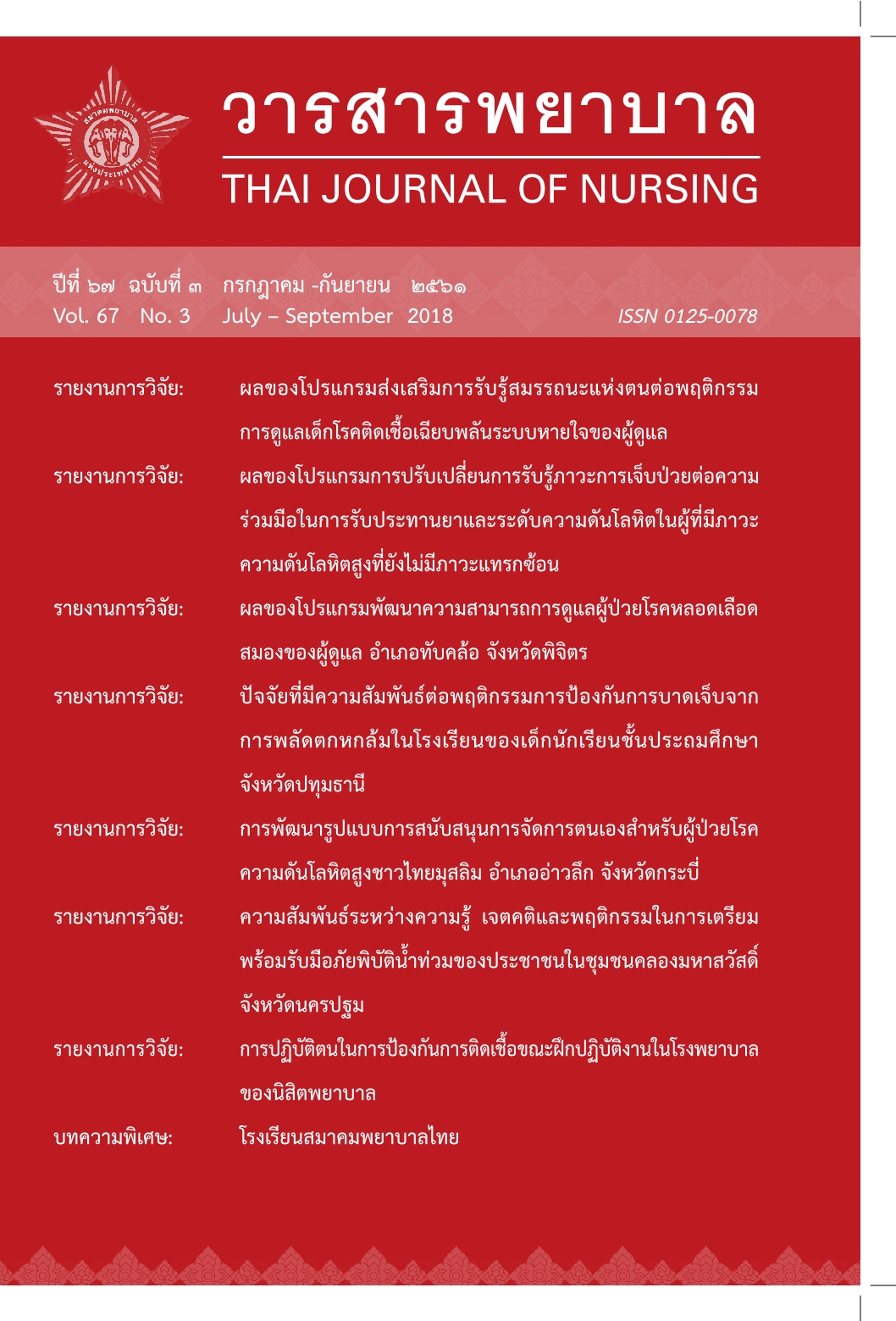The effect of illness perception modification program on medication adherence and blood pressure level among hypertensive patients without complications
Main Article Content
Abstract
The purpose of this quasi-experimental research was to study the effect of illness perception modifif ication program on medication adherence and blood pressure level among hypertensive patients without complications. Patients aged 30-59 years were purposively enrolled from the outpatient department of cardiology clinic at Ramathibodi hospital. The participants were assigned to the experimental and control groups (22 for each group). The control group received a usual care while the experimental group received the illness perception modifif ication program. The program was conducted for 8 weeks. Data were collected using demographic information sheet, medication adherence rating scale, the brief illness perception scale, and the beliefs about medicine questionnaires. The content validity index of
these questionnaires were 1.00, 1.00 and 0.94 respectively. Their Cronbach’s alpha coeffif icients were 0.77, 0.77, and 0.83, respectively. Descriptive statistics and t-test were used to analyze data. The results revealed that: 1) The mean score of medication adherence of hypertensive patients without complication after receiving the illness perception modification program was significantly higher than that before receiving the program at the signifif icant level of .05. 2) After receiving the illness perception modification program, the mean of difference scores of medication adherence in experimental group was significantly higher than that in the control group at the significant level of .05. 3) The mean score of systolic and diastolic blood pressure in hypertensive patients without complication after receiving the illness perception modification program, were significantly lower than those before receiving the program at the significant level of .05. 4) After receiving the illness perception modification program, the mean of different scores of systolic and diastolic blood pressure in experimental group were significantly higher than those in the control group at the significant level of .05.
Article Details
References
อิทธิพลต่อความร่วมมือในการรับประทานยาในผู้ป่วยโรคความดันโลหิตสูงที่ยังไม่มีภาวะแทรกซ้อน. วารสารมหาวิทยาลัย
นราธิวาสราชนครินทร์, 8(1), 16-26.
ยศพล เหลืองโสมนภา, สาคร พร้อมเพราะ, สมบัติ เหลืองโสมนภา และ ยุพาธร เสือเฒ่า. (2556). อิทธิพลของความเชื่อเกี่ยวกับ
การกินยาต่อความร่วมมือในการกินยาของผู้ป่วยความดันโลหิตสูงในระดับสูง. วารสารศูนย์การศึกษาแพทยศาสตร์คลินิก
โรงพยาบาลพระปกเกล้า, 30(2), 146-157.
ยศพล เหลืองโสมนภา, สิริรัตน์ เหลืองโสมนภา, สาคร พร้อมเพราะ, ปาลีรัญญ์ ฐาสิรสวัสดิ์, รุ่งนภา เขียวชะอ่ำ และวารุณี
สุวรวัฒนกุล. (2557). การวิเคราะห์องค์ประกอบเชิงยืนยันแบบสอบถามความเชื่อเกี่ยวกับการกินยาฉบับภาษาไทย.
วารสารศูนย์การศึกษาแพทยศาสตร์คลินิกโรงพยาบาลพระปกเกล้า, 31(4), 297-310.
สมาคมความดันโลหิตสูงแห่งประเทศไทย. (2558). แนวทางการรักษาโรคความดันโลหิตสูงในเวชปฏิบัติทั่วไป พ.ศ. 2555
ปรับปรุง พ.ศ. 2558. กรุงเทพมหานคร: ฮั่วน้ำพริ้นติ้ง.
Alhalaiqa, F., Deane, K. H. O., Nawafleh, A. H., Clark, A., & Gray, R. (2012). Adherence therapy for medication
non-compliant patients with hypertension: A randomized controlled trial. Journal of Human Hypertension,
26(2), 117-126.
American Heart Association/ American Stoke Association. (2014). High blood pressure statistical fact sheet 2014
update. Retrieved March 18, 2016, from https://www.heart.org/idc/groups/heart-/@wcm/@sop/@
smd/documents/downloadable/ucm_462020.pdf
Broadbent, E., Petrie, K. J., Main, J., & Weinman, J. (2006). The brief illness perception questionnaire. Journal of
Psychosomatic Research, 60, 631-637.
Centers for Disease Control and Prevention. (2016). Effects of high blood pressure. Retrieved May 28, 2017,
from https://www.cdc.gov/bloodpressure/effects.html
Chen, S. L., Tsai, J. C., & Chou, K. R. (2011). Illness perceptions and adherence to therapeutic regimens among
patients with hypertension: A structural modeling approach. International Journal of Nursing Studies, 48(2),
235–245.
Horne, R. (2003). Treatment perceptions and self-regulation. In L. D. Cameron & H. Leventhal (Eds.). The self-
regulation of health and illness behaviour (pp.138-153). New York, NY: Routledge.
Horne, R., & Weinman, J. (2002). Self-regulation and self-management in asthma: Exploring the role of illness
perceptions and treatment beliefs in explaining non-adherence to preventer medication. Psychology and Health,
17(1), 17-32.
Horne, R., Weinman, J., & Hankins, M. (1999). The beliefs about medicines questionnaire: The development and
evaluation of a new method for assessing the cognitive representation of medication. Psychology and Health,
14, 1-24.
Lewis, L. M., Askie, P., Randleman, S., & Shelton-Dunston, B. (2010). Medication adherence beliefs of community-
dwelling hypertensive African Americans. Journal of Cardiovascular Nursing, 25(3), 199-206.


